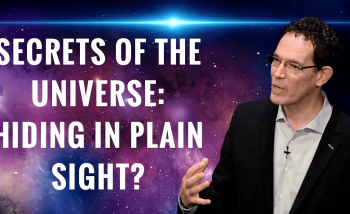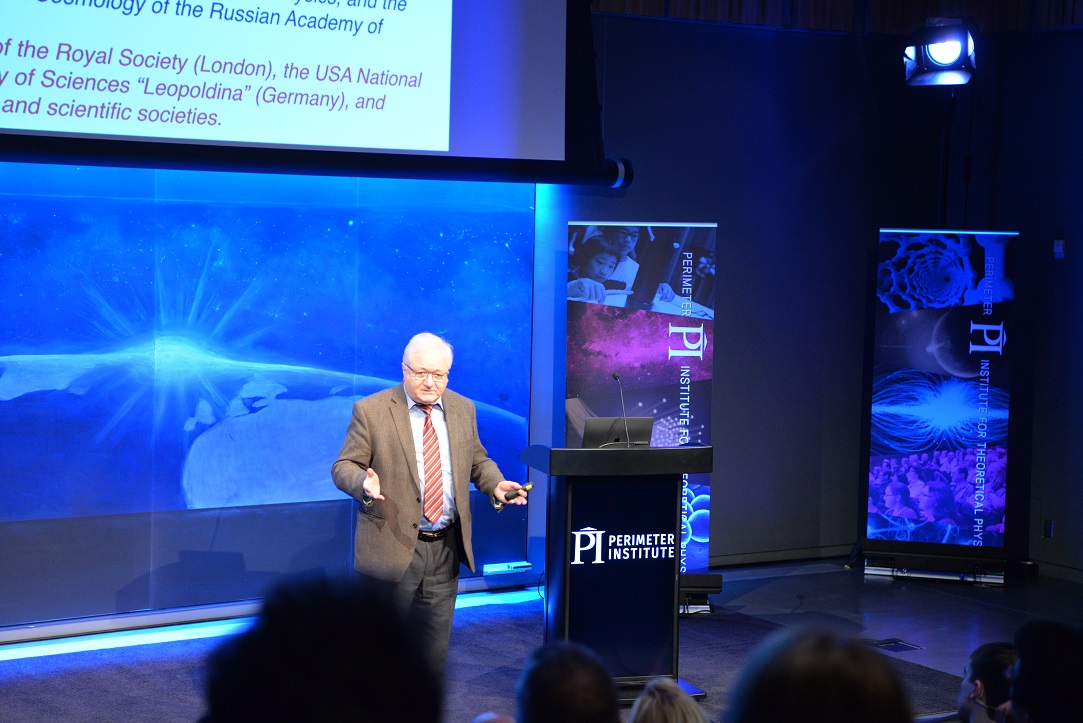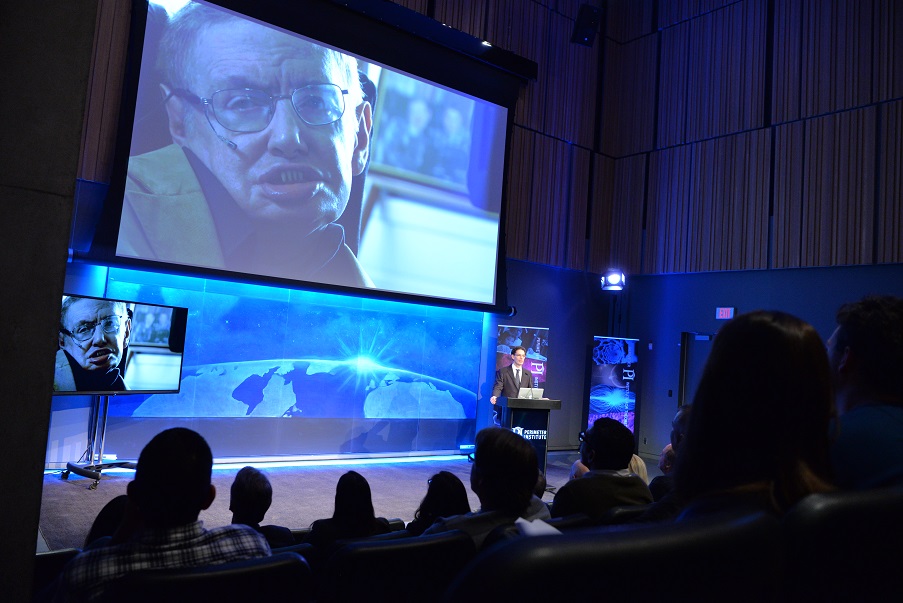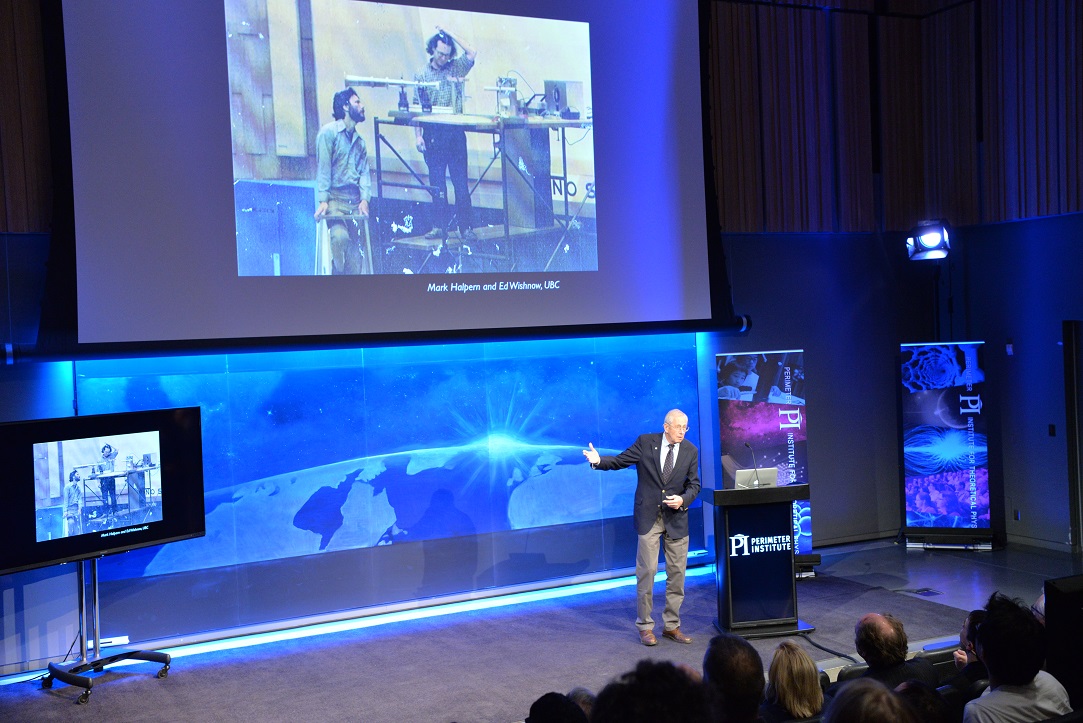Perimeter Institute’s new Centre for the Universe will assemble a mix of eminent international scientists and rising stars to tackle ambitious questions about the origins, evolution, and fate of the cosmos.
The Nov. 20 launch of the Centre at Perimeter Institute featured special talks on cosmology by renowned researchers James Peebles, Rashid Sunyaev, and William East.
Watch the announcement:
When asked if he would provide video greetings to celebrate the Centre’s launch, Stephen Hawking said yes – and went one better.
Hawking also agreed to lend his name to a new research fellowship, to be held by an exceptional young scientist tackling big theoretical questions in cosmology at the Centre for the Universe.
In doing so, Hawking joined two other prominent figures – Peebles and the late Yakov Zel’dovich – as namesakes of fellowships at the new Centre. Zel’dovich was represented at the launch by Sunyaev, his longtime friend and collaborator.
“I am honoured to have my name associated with one of the new fellowships,” Hawking said. “Cosmology is one of the most exciting fields in science today. We are on the verge of major discoveries about the universe and its origins. I hope and expect many of those discoveries will be made at Perimeter.”
Research at the Centre will investigate black holes, the big bang, dark matter, dark energy, and other basic questions in cosmology.
The Centre is founded in partnership with the Canadian Institute for Theoretical Astrophysics (CITA) and the Dunlap Institute at the University of Toronto, the University of Waterloo, Queen’s University, SNOLAB, and York University – institutions involved in some of today’s most important astronomical experiments, including the Square Kilometre Array, the Event Horizon Telescope, and the Canadian Hydrogen Intensity Mapping Experiment (CHIME).
“The exploration of our universe is a wonderful adventure that will certainly not end for a very long time,” said Peebles. “The new Peebles Fellows, Zel’dovich Fellows, and Hawking Fellows at Perimeter will help explore these questions. As a Canadian, I am particularly happy this will happen in Canada, at the Perimeter Institute.”
Stephen Hawking and 2015 Nobel laureate Art McDonald will serve as Scientific Patrons for the Centre, with a steering committee that includes Perimeter Faculty members Asimina Arvanitaki, Avery Broderick, Luis Lehner, Ue-Li Pen, and Kendrick Smith.
New Faculty member Neal Dalal will also be joining the effort. He recently joined Perimeter from the University of Illinois at Urbana-Champaign, where he has pioneered several tests of the nature of dark matter using cosmological data. After receiving his PhD from the University of California, San Diego, Dalal held fellowships at Princeton’s Institute for Advanced Study and CITA. His research probes the fundamental physics of cosmology, the structure of the universe, and the formation of galaxies – often bridging theory, data analysis, and observation.
That theme of bridge-building drives the Centre’s vision. Its principal goal is to design and analyze new observations and experiments to shed light on key mysteries. In tandem, the Centre will support the intense development and testing of new theoretical ideas and techniques.
“We are fortunate to live in a golden age of discovery of the universe,” said Neil Turok, Director of the new Centre.
“Cosmology has always provided some of science’s biggest conundrums. Now, it is providing many of the most important clues which are guiding the future development of fundamental physics. The new fellowships at the Centre of the Universe, named for Hawking, Peebles, and Zel’dovich, will attract top talent to Perimeter. Centre scientists will interact with and inform the entire Perimeter community as we seek solutions to our deepest questions about the universe. I firmly believe we are on the threshold of revolutionary advances.”
About PI
Perimeter Institute is the world’s largest research hub devoted to theoretical physics. The independent Institute was founded in 1999 to foster breakthroughs in the fundamental understanding of our universe, from the smallest particles to the entire cosmos. Research at Perimeter is motivated by the understanding that fundamental science advances human knowledge and catalyzes innovation, and that today’s theoretical physics is tomorrow’s technology. Located in the Region of Waterloo, the not-for-profit Institute is a unique public-private endeavour, including the Governments of Ontario and Canada, that enables cutting-edge research, trains the next generation of scientific pioneers, and shares the power of physics through award-winning educational outreach and public engagement.
You might be interested in
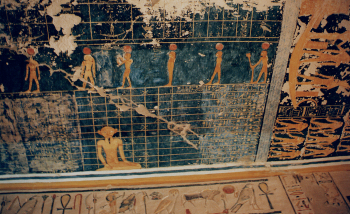
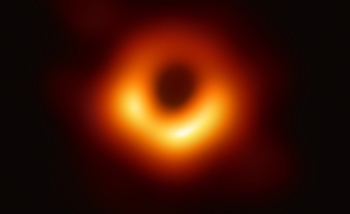
Spiralling light from M87’s supermassive black hole reveals strong magnetic fields
November 8, 2023
